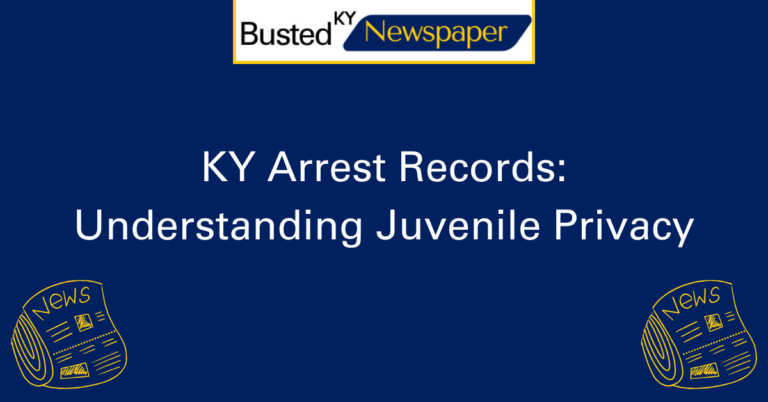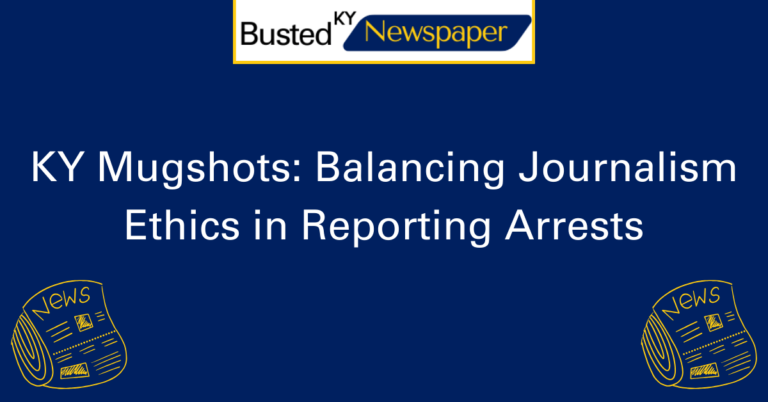Legal Implications of Creating Mugshot Websites in KY
In today’s digital age, the internet has become a powerful tool for sharing information and connecting people from all walks of life. However, with this power comes great responsibility, especially when it comes to the dissemination of personal information. One controversial aspect of online information sharing is the creation of mugshot websites, which display the arrest records and photographs of individuals who have been taken into police custody.
While these websites may seem like a convenient way to access public records, they raise important legal implications that cannot be ignored. In the state of Kentucky, the creation and maintenance of mugshot websites have become a topic of heated debate, with concerns ranging from invasion of privacy to the potential for harassment and discrimination. It is essential to understand the legal landscape surrounding these websites and the potential consequences for those involved.
The Legal Landscape of Mugshot Websites
As the debate surrounding mugshot websites continues to unfold in Kentucky, it is crucial to delve deeper into the legal implications surrounding these controversial platforms. While they may appear to provide easy access to public records, their existence raises significant concerns regarding privacy, harassment, and discrimination. Understanding the legal landscape surrounding mugshot websites is essential for both individuals involved and the wider community.
Privacy Concerns and Invasion of Personal Information
One of the primary concerns associated with mugshot websites is the invasion of personal privacy. The publication of arrest records and photographs can have severe consequences for individuals, even if they were never charged or found guilty of a crime. By making this information readily available to the public, these websites expose individuals to potential discrimination, stigmatization, and harm to their personal and professional lives.
Potential for Harassment and Discrimination
Mugshot websites also raise concerns regarding the potential for harassment and discrimination. By making individuals’ arrest records easily accessible, these platforms provide a breeding ground for online bullying, harassment, and even vigilantism. The public exposure of personal information can lead to reputational damage, threats, and other forms of harm, impacting individuals’ mental and emotional well-being.
Legal Implications and Challenges
Navigating the legal landscape surrounding mugshot websites presents a challenging task. While the First Amendment protects the freedom of speech and the press, it also recognizes limitations in cases where harm or injury may result. Courts have grappled with striking a balance between the public’s right to access information and the potential harm caused by the dissemination of mugshots. This ongoing legal debate highlights the complexity of the issue and the need for comprehensive legislation to address the concerns raised.
Legislative Efforts and Possible Solutions
Recognizing the need for legal intervention, several states have taken steps to regulate mugshot websites. For example, some states have enacted laws that require websites to remove arrest records and photographs upon request, especially if the individual was not convicted of a crime. Additionally, lawmakers are exploring ways to hold website operators accountable for potential harm caused by the publication of mugshots. This legislative action aims to strike a balance between public access to information and protecting individuals from the negative consequences of mugshot websites.
Protecting Online Privacy and Ensuring Accountability
Protecting individuals’ online privacy and ensuring accountability for website operators is a crucial step in addressing the concerns raised by mugshot websites. By implementing robust privacy laws and holding website operators accountable for the potential harm caused, we can strike a balance between the public’s right to access information and protecting individuals’ rights and well-being. Legislators, legal experts, and the community need to work together to find viable solutions that respect both individual privacy and the public’s right to information.
FAQ’s
Are mugshot websites legal?
The legality of mugshot websites hinges on the public nature of arrest records. Generally, these websites operate within legal boundaries, as arrest information is considered a public record. Law enforcement agencies routinely release mugshots as part of their transparency initiatives. However, the ethical implications arise from the business models of these websites, often criticized for charging individuals substantial fees for the removal of their mugshots. This practice has prompted legislative responses in some U.S. states to regulate or restrict the operations of mugshot websites, seeking to balance the transparency of public records with privacy concerns.
What are the concerns surrounding mugshot websites?
Mugshot websites have raised profound concerns, particularly regarding privacy and the potential for misuse of personal information. The fundamental issue revolves around the reputational harm that individuals may suffer due to the public display of their arrest records, irrespective of case outcomes. This perpetuation of negative stereotypes can unfairly stigmatize individuals who may be innocent or have completed their legal obligations. Moreover, the commercialization of mugshots, with some websites demanding removal fees, has drawn criticism for commodifying individuals’ legal troubles. The absence of industry regulations further compounds these concerns, leaving individuals susceptible to unwarranted public scrutiny and potential repercussions in their personal and professional lives.







